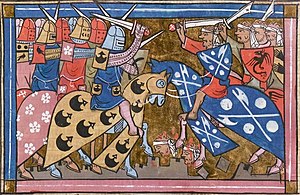
Back Kruistog Afrikaans Kreuzzug ALS የመስቀል ጦርነቶች Amharic Cruzadas AN حملات صليبية Arabic حملات صليبيه ARZ Cruzaes AST Səlib yürüşləri Azerbaijani صلیب یوروشلری AZB Тәре яуҙары Bashkir

The Crusades were a series of religious wars initiated, supported, and sometimes directed by the Christian Latin Church in the medieval period. The best known of these military expeditions are those to the Holy Land between 1095 and 1291 that had the objective of reconquering Jerusalem and its surrounding area from Muslim rule after the region had been conquered by the Rashidun Caliphate centuries earlier. Beginning with the First Crusade, which resulted in the conquest of Jerusalem in 1099, dozens of military campaigns were organised, providing a focal point of European history for centuries. Crusading declined rapidly after the 15th century.
In 1095, after a Byzantine request for aid,[1] Pope Urban II proclaimed the first expedition at the Council of Clermont. He encouraged military support for Byzantine emperor Alexios I Komnenos and called for an armed pilgrimage to Jerusalem. Across all social strata in Western Europe, there was an enthusiastic response. Participants came from all over Europe and had a variety of motivations. These included religious salvation, satisfying feudal obligations, opportunities for renown, and economic or political advantage. Later expeditions were conducted by generally more organised armies, sometimes led by a king. All were granted papal indulgences. Initial successes established four Crusader states: the County of Edessa; the Principality of Antioch; the Kingdom of Jerusalem; and the County of Tripoli. A European presence remained in the region in some form until the fall of Acre in 1291. After this, no further large military campaigns were organised.
Other church-sanctioned campaigns include crusades against Christians not obeying papal rulings and heretics, those against the Ottoman Empire, and ones for political reasons. The struggle against the Moors in the Iberian Peninsula–the Reconquista–ended in 1492 with the Fall of Granada. From 1147, the Northern Crusades were fought against pagan tribes in Northern Europe. Crusades against Christians began with the Albigensian Crusade in the 13th century and continued through the Hussite Wars in the early 15th century. Crusades against the Ottomans began in the late 14th century and include the Crusade of Varna. Popular crusades, including the Children's Crusade of 1212, were generated by the masses and were unsanctioned by the Church.
- ^ Helen J. Nicholson, The Crusades, (Greenwood Publishing, 2004), 6.